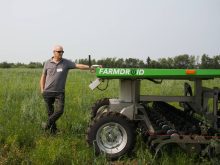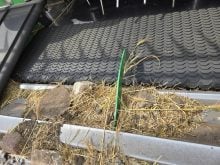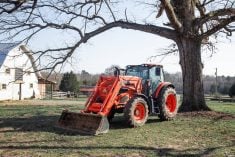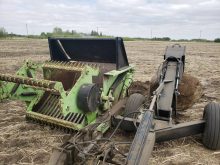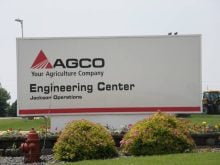The opening of a dedicated-organic grain unloading, storage and milling system made Aaron Tully do what no farmer wants to do in beautiful weather at harvest time. He left the farm for the city.
But Tully said he felt both relief and gratitude that the Tall Grass Prairie Bakery in Winnipeg was installing a system to increase its ability to make organic foods.
“I’ve been carrying bags of grain to Tall Grass for 12 years and this just means I don’t have to carry all those bags on my shoulder any longer,” said Tully, a Portage la Prairie farmer, with a broad smile.
Read Also

New Alberta funding for program hopes to further unlock agritourism industry in province
Alberta Farm Fresh Producers Association is launching a new initiative thanks to $300,000 of provincial funding to bolster Alberta’s smaller scale family farms and agritourism sector.
“On our own farm, we grind all our own grain. We make our own bread. It tastes awesome. I think it’s great these people are doing the same thing for people in the city.”
The bakery, a popular Winnipeg institution, opened a 450-bushel bin right beside its baking wing at The Forks market. Grain can be unloaded directly from the truck and consumers and tourists can see the grain moving through the transparent piping.
They can then see it augured from the bottom of the bin to the stone-grinding equipment in the bakery.
The Canadian Wheat Board helped pay for the bin, believing it was useful to educate urbanites about how grain becomes food.
“Today is really a celebration of the connection between rural and urban and the connection between the farmers and the people they feed,” said Ian White, the CWB’s chief
executive officer.
Tall Grass co-owner Tabitha Langel gave an emotional address about her bakery’s longtime commitment to local farmers and organic production, choking up at times as she described what her business means to her.
“It was a small group of people who wanted to support local organic agriculture,” said Langel about the people who formed the bakery 19 years ago.
“There were many conversations around the kitchen table, in the city, at church and at the local food co-op on how best to do this.”
They always knew that competing on price with the big bakeries was a losing proposition and buying cheap grain wasn’t something they wanted to do. They had to build a committed clientele.
“We would need strong community support – customers who were willing to pay more for a loaf of bread if they knew the farmers would get a better return,” said Langel. “We knew that this would involve nurturing and growing a direct connection between the farms and the customers.”
Treherne farmer Fran Deruyck, who supplies wheat and sunflower seeds to Tall Grass, said she’s delighted the bakery will be able to increase organic bread production without having to break the backs of farmer suppliers.
“It means a lot to us because we’ve had to bag it in 60 pound bags and haul it all in by hand,” she said.
“Now they’re coming out to the farm with a truck to pick it up and we no longer have to haul it in by hand.”



